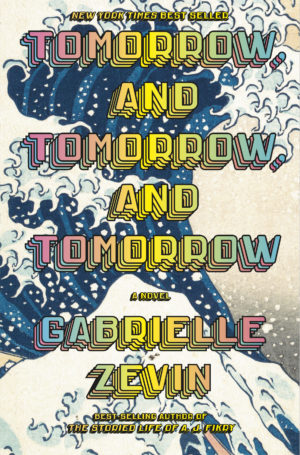Tomorrow and Tomorrow and Tomorrow
by Gabrielle Zevin
reviewed by Yoojung Chun
Tomorrow and Tomorrow and Tomorrow by Gabrielle Zevin is part coming-of-age story, part love letter to the video game industry, and part exploration of the enduring power of friendship.
Taking its title from the famous soliloquy from Macbeth, Zevin’s novel has it that one is but “a poor player” in the game of life. But, unlike Macbeth, Zevin’s protagonists have the privilege of twentieth-century video game technology. In video games, the game of life never ends. “It’s tomorrow, and tomorrow, and tomorrow. It’s the possibility of infinite rebirth, infinite redemption. The idea that if you keep playing, you could win.”
The novel follows its two protagonists, Sam Masur and Sadie Green, whose unlikely friendship is sparked in a children’s hospital game room. Years later, the two run into each other again, while Sam is at Harvard and Sadie is at MIT. Together, they develop a brilliant video game, Ichigo, which earns them wealth and fame but brings on fresh calamities. Spanning some thirty years, the novel follows Sam and Sadie’s tumultuous friendship while providing an incandescent, nostalgia-filled romp through the American video game industry during its most vibrant years.
Broadly, the story of Sam and Sadie’s relationship resonates with contemporary titles like Sally Rooney’s Normal People and Elena Ferrante’s My Brilliant Friend. Like Rooney and Ferrante, Zevin is interested in how modern relationships are mediated via identity politics and privilege. Sam, who is Korean-American, working class, and physically disabled, admires yet resents Sadie for her wealthy background free of childhood trauma. Sadie, in turn, suspects that Sam takes advantages of her relationship with powerful men in the industry, and fears that she gets no credit for her work as a woman in the gaming industry. Despite ups and downs, however, Sam and Sadie maintain a personal, professional, and creative partnership that outlasts all other relationships in the book. Zevin does not have recourse to a romance plot, instead creating a wholly believable and ultimately loveable vision of creative friendship.
While the novel does a great job at making itself accessible to readers who aren’t well versed in video games, its engagement with the history of the American video game industry is exceptionally well researched and ambitious. Sam and Sadie’s first video game, Ichigo, does not shy away from the heavy Japanese influence that characterized the late twentieth century indie video game scene, while Sadie’s university game project Solution brings to mind many brilliant, single-developer titles that were in vogue in the early years of the Internet. The game itself alludes to hundreds of popular titles in the heady years of 1980–2010, ranging from Super Mario to Animal Crossing. Sadie and Sam’s games are inspired by trends and developments in the industry, forming a creative arc that provides an overview of how far video games have come. For video game fans, Tomorrow and Tomorrow and Tomorrow achieves what A. S. Byatt’s Possession did for fans of Victorian literature: it provides a delightfully immersive retrospective of a beloved genre through fictitious titles.
Tomorrow and Tomorrow and Tomorrow is also a manifesto for what video games can do for us. Zevin is wary of encouraging common misconceptions of video games as violent or juvenile; instead, she is interested in exploring what video games, as unique forms of art, can do. For example, Sam and Sadie’s second game, Both Sides, features a bedridden girl toggling back and forth between the stark reality of a hospital bed and the fantasy world within which she can roam free and conquer evil. Sam’s own struggle with his physical disability is given an alternate reality through the development of Both Sides.
The novel also addresses American national tragedies, gently pointing out how games can ease human suffering. After 9/11, people are comforted by the release of a feel-good farming simulator called Mapleworld, “a virtual world that was better governed, kinder, and more understandable than their own.” When San Francisco’s issuance of same-sex marriage certificates in 2004 is thwarted by the Supreme Court, Sam creates same-sex marriage functionality in Mapleworld, because “there will be some people for whom Mapleworld will be the only place they can get married.” The scene reminds readers of The Sims franchise and its prescience about marriage equality.
In many ways, Tomorrow and Tomorrow and Tomorrow is a novel about 2022 as much as it is a novel about the turn of the century. Covid-19 has made the world reevaluate its relationship to digital platforms, and lengthy lockdowns have effected change in the video game industry as well. A farming simulator, Stardew Valley, became popular during Covid; meanwhile, players of Animal Crossing found new ways to grieve as they built digital memorials after traditional mourning rituals became impossible due to the pandemic. Zevin’s novel is a thoroughly enjoyable novel about friendship—a trip down memory lane for the millennial gamers among us and a manifesto for the art of play.
Published on March 7, 2023

